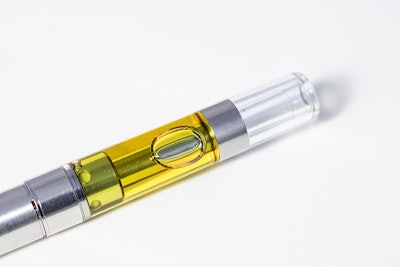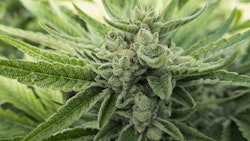
Washington became the latest state to respond to the nationwide outbreak of vape-related lung illness when it adopted emergency rules Oct. 16 that prohibit the sale of flavored vape products in the state.
According to a subsequent notice issued by the Washington State Liquor and Cannabis Board (WSLCB), these emergency rules require its cannabis licensees to take a few immediate actions.
First and foremost, of course, all licensees must immediately halt the sale of all flavored vape products in the state. They must also disclose all compounds, such as ingredients, solvents, additives, preservatives, thickening agents and terpenes, that are added to or used to produce cannabis concentrates and extracts intended for inhalation. Retailers are required to post a vape-related warning sign at all their locations. Finally, the emergency regulations mandate that licensees cooperate with an ongoing investigation into which products have been involved with cases of vape-related lung illnesses in Washington.
“The state of Washington is concerned that any potential contaminants inside those products are a concern and need to be evaluated,” Anna Shreeve, president of Urban Paragon, Inc., Targeted Intent, Inc. and The Bakeréé, a Seattle-based dispensary, tells Cannabis Business Times. “They placed a 120-day—basically, a four-month—review period on their emergency rules. Their emergency rules, when they came out initially, included that you could not have any additives in your vape cart. In particular, the vitamin E oil, which converts into an acetate, and other products, like MCT, PEG, and VEG. At that point, it was undetermined and confusing related to food-grade terpenes.”
About a week after the rules were released, the state clarified that food-grade terpenes were indeed prohibited, and that only naturally derived cannabis terpenes from within the state’s seed-to-sale tracking system, produced by a state-licensed cultivator or processor, would be allowed.
“Food-grade terpenes were used by many companies as an additive to their distillate carts,” Shreeve says. “Those carts tended to be a little lower priced, loved by customers and really high potency.”
Some of Washington’s cannabis processors had been purchasing food-grade terpenes from outside the state from companies that sell blended terpenes to represent certain cannabis varieties and flavors like bubblegum and cotton candy, she adds. With these practices essentially outlawed in the state’s emergency ruling, many companies had to pivot—and fast.
“That was difficult for stores because now, you literally have a … fairly significant number of the carts in stock that utilize food-grade terpenes, and they’re primarily the lower-priced products,” Shreeve says. “You can imagine the concerns that the processors had in doing returns. Not everyone was able to do a return because it would put their company under. … So, it really put a strain on retailers and surely a strain on the processors that basically led with those types of products. The companies that utilize naturally derived cannabis terpenes, they were able to gain literally overnight a more significant market share.”
If noncompliant products cannot be returned, they must be destroyed according to a destruction plan outlined in the emergency rules, Shreeve says, although some retailers are holding on to nonreturnable products until the conclusion of the state’s four-month review period.
It is unclear whether Washington will approve food-grade terpenes at the end of their review, but if it does, Shreeve says the state will need to establish protocol to ensure there are no contaminants in those additives.
“There’s lobbying on both sides of the equation,” she says. “There are many processors that would like to use food-grade terpenes because they don’t have the ability [or the equipment] to process … the naturally derived cannabis terpenes, or do a high-terpene extraction cart, a rosin cart or any of these other naturally derived products.”
With public health and safety at the forefront and a lack of federal oversight, what are cannabis companies to do in the wake of these restrictive rules? How can the industry move forward in the best interest of consumers?
“When there’s no oversight … from the Food and Drug Administration or the Department of Health or the USDA, when it’s state by state by state and all of these regulations differ, then it is the responsibility of the retailer and the brands to provide some level of public safety,” Shreeve says. “This is an unusual situation, isn’t it? There is this giant, thriving cannabis industry that is growing where there is not federal FDA labeling. … Do we really understand the safety issues around them? Are we really prepared for the level of product liability that we’re responsible for? … It’s actually a good thing that this is happening now. It’s a good thing that the Department of Health is evaluating this.”
For Heylo Cannabis Founder and CEO Laurel “Lo” Friesen, the goal has always been to create an extract that is as close to the plant as possible. Friesen is a chemist with a background in medicine, and chose CO2 extraction as her method of choice to produce the company’s vape cartridges with naturally derived terpenes.
“Vape cartridges are some of the best delivery methods, whether it’s to reduce inflammation or reduce pain,” Friesen tells Cannabis Business Times. “It’s just such an immediate effect. … Vapes are such a great delivery method, but they’re also great for recreation, so we knew vapes would be our focus from the beginning. We have always focused on quality. Because I am the sole owner of Heylo, I feel like we’ve had the liberty to make decisions from the ground up. We are able to pivot when we need to, but from the beginning, I established that we would be creating a premium product and trying to raise the bar in the cannabis industry.”
Heylo has responded to the vape crisis by being as open and transparent as possible, she adds. The company has been vocal about its process and its focus on sourcing clean product, which includes its careful selection of cultivation partners.
“We are a processor only, so we have to work with growers to grow flower for our process,” Friesen says. “That takes a lot of time, making sure they’re growing it in a safe manner, and that the product is clean. It starts with that.”
Heylo has a vendor validation system that requires all its partners to complete a form and disclose their growing practices, as well as any products they use, such as nutrients and soil additives. The form also asks about cultivators’ drying and curing processes.
“It’s basically a disclosure contract saying that I’m telling you the truth, but we take it a step further and … we test every single batch that comes through here,” Friesen says. “Whether we’re working with a new grower or not, that product will be tested. So, if you don’t tell us now, we’re going to find out anyway.”
In addition, the company works with two vape cartridge suppliers that must provide Heylo with regular testing results on random lots from their manufacturing facilities, as well as MSDS sheets of their products.
“All that said, that affects the price,” Friesen says. “We’re putting in a lot of work, and some people can’t afford the higher prices and it’s hard to spend money on this stuff if you don’t understand the impact that it can have. … We do everything we can [to communicate] our values, our education [and] transparency. We offer tours to show the value of the great lengths that we go to to ensure the safety of our consumers, but at the end of the day, it comes to what they’re looking for on the shelf.”
Vaping is down 20 to 25 percent overall in Washington, Friesen says, and Heylo felt the decrease in sales. When news of the vape-related illnesses and deaths grabbed national headlines, some of Heylo’s customers stopped vaping altogether, she adds.
“We definitely saw a lull in sales over the first few weeks of all this going on, and then when the governor made that statement regarding banning flavorings, that was really when we took the opportunity to be vocal about our products and that they’ve always been clean and that we’ve always used the best quality cannabis that we can find—everything comes from the cannabis plant,” Friesen says.
Some retailers had to pull many—if not all—vape products off their shelves following the emergency ruling due to noncompliance, and some of these dispensaries then contacted Heylo for products.
Canna Organix, a hybrid greenhouse grower in Sequim, Wash., has also been creating vape products that are entirely cannabis-derived and that contain no external flavoring, but the company also works with Werc Shop, an out-of-state provider of botanically derived terpenes, to procure product for their flavored vapes. Although the Werc Shop’s terpenes are natural, Canna Organix could no longer work with them under the state’s emergency rules since the company is not located in Washington.
“For us, we were already producing products that were pure [and] single-sourced from Canna Organix, but now we had to understand that our flavored vaping products were no longer allowable, [but] that our existing high-terpene extract product would be able to fill that void in the marketplace because it is a higher end product,” Canna Organix President Kerry Bennett tells Cannabis Business Times.
The company has always produced soil-grown, hand-watered and hand-trimmed plants, and has chosen its vape cartridge manufacturer carefully to ensure that the products are high-quality and third-party tested.
“We’ve embraced that philosophy, regardless of who we are partnering with,” Bennett says. “[If it’s] a packaging company, we’re looking at sustainability, recyclability. Even the retailers that we work with, we’re very select. We’re not the ideal product for some retailers because they’re wanting a lower cost product and they’re not as concerned about, is this pesticide-free? Is this certified? We’ve always had that approach, even with our staff. We’re very fortunate to have a reputation that allows us to be in a strong position to be able to negotiate and be very selective about who we put under the roof.”
Following the emergency ruling in Washington, Canna Organix’s sales plummeted 85 percent, Bennett says.
“When we reached out to retailers, I think the general consensus was that retailers were waiting to see how their customers were going to pivot,” he says. “They wanted to see what happens when I come in and the product I use is no longer available. Am I shifting to flower? Am I shifting to concentrates? Am I shifting to edibles? Am I spending more money on a true cannabis cart that is not third-party flavored? So, part of the sales impact was not directly correlated to our brand. It was really the reluctance of retailers to put any type of meaningful order in until they had some time to see what their customers were going to do.”
A few weeks after the emergency rules came out, Canna Organix’s sales rebounded to where they were before the flavored vape ban, Bennett says.
“Unfortunately, that was not the case with the majority of the market, and there was definitely a lot of significant negative impact on a lot of businesses, especially those that were focused on the vaping realm,” he adds. “Even though they weren’t doing anything wrong, and their products—I would say they were safe, given the amount that was being sold as compared to the amount of no reported illnesses. They were doing things different than us. I think we’re a little unique in that we were prepared for this going into it, but we were only prepared going into it because we chased such a high level of quality product anyway that, … in some ways, we were definitely impacted less than some of our peers, for sure.”
Washington is certainly not the only state that has responded to the vape crisis with emergency rules. Massachusetts and Oregon are working through the legal nuances of temporarily banning the sale of all vape products, while Colorado regulators have taken steps to ban certain additives, including polyethylene glycol (PEG), vitamin E acetate and medium chain triglycerides (MCT oil).
And consumers are taking notice.
“I think the consumers are a little afraid to vape because there is so much hype and fear generated,” Shreeve says. “[Washington] had a big news conference, and they definitely were very firm about why they’re doing this to benefit public safety, so the consumers, if they were loving a particular brand and now it’s not there and they’re having to switch brands and try something else, they really need support and education from the retailer. … It’s caused us to really be able to explain the difference between the processes that the different processors use to make their vape carts and what’s in it.”
Overall, Friesen views the vape crisis as an opportunity for the industry to not only improve its practices, but also for regulators to create more comprehensive guardrails for businesses.
“Although all of the vape illnesses and these deaths are tragic, I think we have an opportunity in front of us to change the way we do business going forward and to reduce the tolerance for these additives and for people to lower their prices,” she says. “Everything has been affected by it, and people are going out of business because of these bans, but at the same time, they’re recognizing that maybe the products that they were using in their cannabis are not safe.”
Bennett echoes this sentiment, emphasizing that this setback is an opportunity for the cannabis industry to reassess the quality of its practices and products.
“I think that what has happened for all of us is an opportunity to really look at our own business, our own value and philosophy propositions, and really put quality back into the driver’s seat for those that maybe haven’t as much,” he says. “For those that have, [they should] really reassess the importance that the quality product is the obligation that we have to this market—to provide a very clean, high-quality product and to assure our customers shortcuts are not being taken in the chase for profitability, that the quality needs to come first every time."























